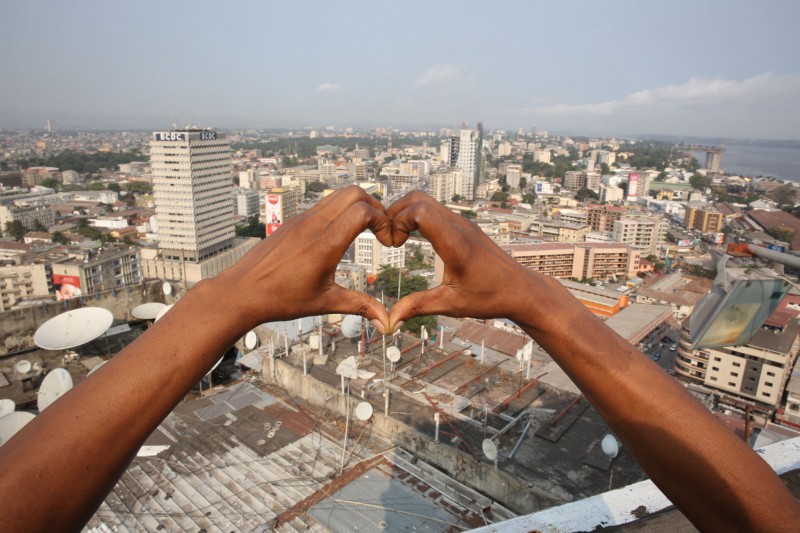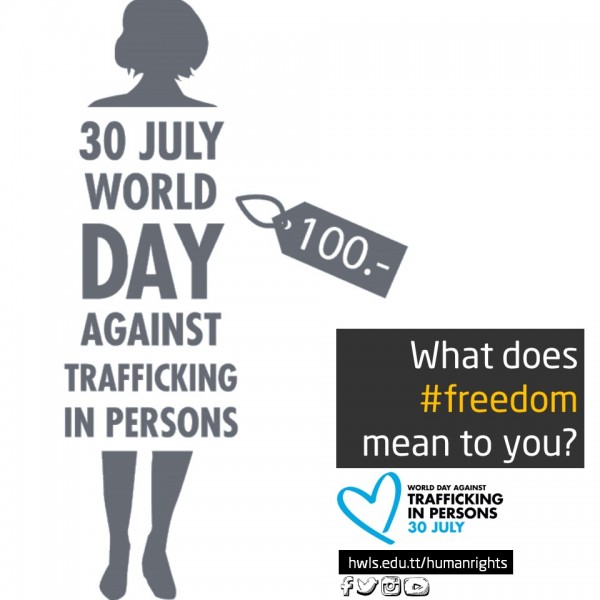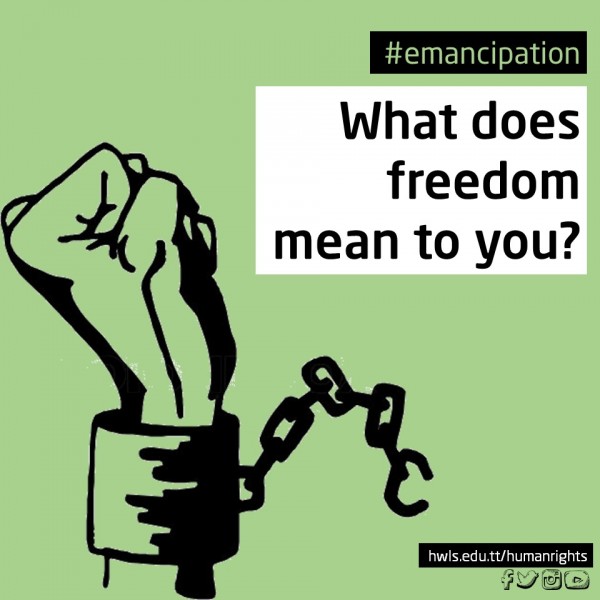Future Caribbean Lawyers Give Hope to Victims of Human Trafficking

Kinshasa, DR Congo: A woman’s hands make the heart-shaped logo of the World Day of dignity for victims of human trafficking, celebrated on 30 July. Photo by MONUSCO Photos; Photographer: Abel Kavanagh; used under a CC BY-SA 2.0 license.
Students across law schools in the Caribbean joined hands to participate in a global online campaign to raise awareness on World Day Against Trafficking In Persons. They spoke out about the crime in their countries and showed solidarity with its victims in their societies.
“I Give Hope”. HASHTAG: #igivehope pic.twitter.com/AsEMFLFVyw
— UNDP T&T (@UNDP_Trinidad) July 30, 2015
Students of the Hugh Wooding Law School in Trinidad and Tobago got in on the action.
 Guyanese student, Stefan Knights, who participated in the human trafficking project undertaken by the law school's Human Rights Law Clinic, gave an analysis on the impact of human trafficking in the Caribbean region:
Guyanese student, Stefan Knights, who participated in the human trafficking project undertaken by the law school's Human Rights Law Clinic, gave an analysis on the impact of human trafficking in the Caribbean region:
In the Caribbean, human trafficking takes different forms. The most popular form of trafficking up for discussion is generally women and girls being forced into prostitution on the streets. However, this is not the only type of sexual exploitation occurring in the region. Child sex tourism which is common in Belize and the act of adults pressuring children to engage in sex acts with men and women in exchange for money or gifts constitute the crime of human trafficking. Forced labour and domestic servitude are other forms of human trafficking. These forms of human trafficking are visible in the Caribbean but are often ignored by society. Examples would include forced labour in the fishing industry and on construction sites. Recently, in Suriname, a farmer was arrested on human trafficking charges after Guyanese nationals claimed that they were forced to work for free on his farm. Moreover, in Guyana and Trinidad, the prevalent act of forcing children into street vending and begging is form of human trafficking. Further, another example of human trafficking is where children are forced into domestic servitude, after their parents sent them to live with and work for an outside family who agrees to provide food, clothing and shelter; this is common in Haiti.
Knights wet on to discuss the effect of human trafficking to Caribbean societies:
Human trafficking presents enormous challenges for sustainable human development in the Caribbean. Indubitably, victims will suffer the greatest impacts ranging from risk of HIV AIDS and STDs infections to psychological and emotional trauma to the denial of the enjoyment of a number of basic human rights. The consequences of human trafficking are equally grave for society at large. Trafficking in persons is likely to exacerbate major societal issues such as violence, corruption and poverty.
The observance of World Day Against Trafficking In Persons coincided with the Human Rights Law Clinic's latest project in which the question “What does freedom mean to you?“ is asked. On August 1, various territories commemorated the anniversary of emancipation of African slaves in the British West Indies.
 Meanwhile, other students at the law school were happy to participate in the #igivehope campaign, by participating in the coordinated mass social media message.
Meanwhile, other students at the law school were happy to participate in the #igivehope campaign, by participating in the coordinated mass social media message.
Today is the National Day Against Trafficking in Persons! The members of the HRC Executive want to remind you to support the cause and spread the message! Post a picture today of yourself alone or with friends making a heart and tag us! Don't forget the hashtag #igivehope – we'll be reposting your pics 😃 Tell a friend! #speakout #HumanTrafficking #HumanRights #igivehope 💙 A photo posted by HWLS Human Rights Committee (@hwls_hrc) on
A photo posted by HWLS Human Rights Committee (@hwls_hrc) on
But despite the social activism, much more needs to be done in the region to curb human trafficking in the region. Knights concludes:
Undeniably, human trafficking is a very complex issue for Caribbean countries to address and there cannot be a one-size-fits-all solution to this problem. However, there needs to be greater public awareness on this subject matter and a better system to report this crime and support the victims.
Support our work
Global Voices stands out as one of the earliest and strongest examples of how media committed to building community and defending human rights can positively influence how people experience events happening beyond their own communities and national borders.
Please consider making a donation to help us continue this work.







3 comments